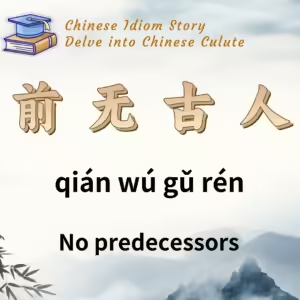
Chinese Idiom: 后来居上 (Hou Lai Ju Shang)
English Translation: Later arrivals surpass those who came earlier
pīn yīn: hòu lái jū shàng
Idiom Meaning: Originally, this idiom referred to less experienced individuals surpassing those with more experience. It is now used to describe situations where later developments or people progress rapidly and either catch up to or exceed their predecessors.
Historical Source: “Records of the Grand Historian” (《史记·汲郑列传》)
Idiom Story:
During the reign of Emperor Wu of the Han Dynasty, a man named Ji An (汲黯) served as a high-ranking official known as the Central Great Minister. Known for his frank and forthright advice, Ji An was eventually reassigned to govern the Eastern Sea region (modern-day Shandong and Jiangsu). His effective governance in that area earned him a return to the capital, where he was appointed as the Master of the Nobles, placing him among the “Nine Ministers” of the court.
Despite his accomplishments, Ji An continued to speak candidly to Emperor Wu, who both respected and disliked him. At the same time, two minor officials, Zhang Tang and Gongsun Hong, were ingratiating themselves with the emperor. Before long, both were promoted—Gongsun Hong became a marquis and a minister, while Zhang Tang rose to the position of Grand Historian. Many of Ji An’s former subordinates also outpaced him in rank.
Unhappy with this situation, Ji An approached Emperor Wu and remarked, “Your Majesty, you treat your ministers like a pile of firewood, with those brought in later placed on top of those who came before.”
Although the emperor ignored his comment, Ji An’s words eventually gave rise to the idiom “后来居上,” which is now used to describe situations where those who arrive later surpass their predecessors, highlighting the dynamic nature of progress and achievement.






